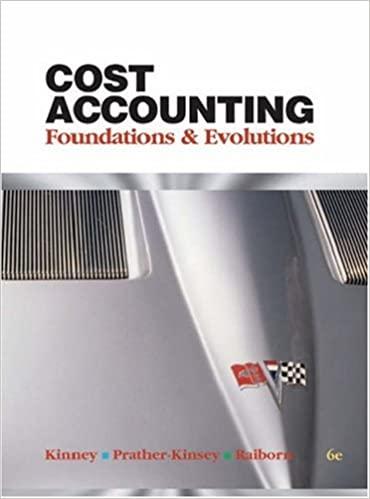(Clost control) The managers and partners that were interviewed listed re duced manpower costs as the major...
Question:
(Clost control) The managers and partners that were interviewed listed re¬ duced manpower costs as the major advantagefor utilizing paraprofessionals [in CPA firms]. It seems that these savings were realized in a number of ways. First, there were significant savings in the salaries ofparaprofessionals when compared with new staffprofessionals. Furthermore, since a large number of paraprofessionals were employedfor less than 40 hours, manyfirms were re¬ alizing a significant savings in fringe benefit cost. As one manager indicated, “When we want to review inventory, we always try to get ourparaprofessional because of his experience in the use of the audit guide, insights on inventory procedures, and level of training. ’’ Partners and managers indicated that the part-time nature of the employment agreementfor most paraprofessionals of¬ fered the firm greaterflexibility in scheduling work around peak business pe¬ riods and aided in reducing hours that cannot be billed.
Certainly, the savings discussed above can have a significant impact on dwindling profit margins or can be passed on to the client in the form, of re¬ ducedfees. As indicated [in this article], the billing rate for accounting para¬ professionals seems to be around $60 per hour (for both large and small firms).
Most managers reported that the billing ratefor accounting paraprofes¬ sionals was 10-15 percent below that of new professional staffpersonnel. One managerfrom a [large]firm indicated that the standard billing rate for para- professionals was $68 per hour and up to $115 per hourfor those with more experience.
For the same firm, the standard billing rate for beginning staffprofession¬ als was $115 per hour.
Quality of work, especially on job assignments that require a large amount of detailed and repetitive tasks, was also cited on several occasions as a major consideration when employing accounting paraprofessionals. The fact that paraprofessionals are able to spend longer periods of time on jobs and their willingness to do repetitive tasks may explain the improved quality of work ofparaprofessionals.
As one manager stated, “The quality of work of our paraprofessionalsfar exceeds that of our new staffprofessionals. ” Some of the practitioners who were interviewed still expressed concerns about utilizing paraprofessionals and the legal implications of using “less than qualified” individuals on au¬ dits. When considering using paraprofessionals on audit engagements, an ar¬ gument could be advanced that the use of “less than competent audit personnel” is a violation of auditing standards. Of course the basic question is: Do these individuals possess the technical attributes one would normally expect of individuals working in that capacity?
Source: Ted R. Compton, "Staffing Issues for the New Millennium—The Emerging Role of the Accounting Paraprofessional,” Ohio CPA Journal (July-September 2000), pp, 56ff.
a. Discuss the use of part-timers and paraprofessionals from the perspec¬ tive of controlling costs.
b. How could the use of part-timers and paraprofessionals impair the qual¬ ity of work performed by public accounting firms?
C. How could the use of part-timers and paraprofessionals affect the effec¬ tiveness and efficiency with which work is performed in public account¬ ing firms?
LO.1
Step by Step Answer:

Cost Accounting Foundations And Evolutions
ISBN: 9780324235012
6th Edition
Authors: Michael R. Kinney, Jenice Prather-Kinsey, Cecily A. Raiborn





